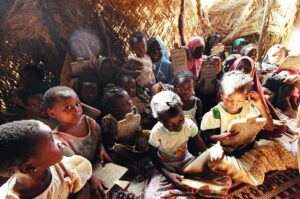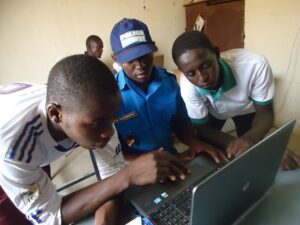By Kayleigh Redmond and Kayla Ruff
In 2021, 21 Nigerien children died when their school, which was made of straw, caught on fire.
Not only were these straw buildings deemed physically unsafe, they were also considered to be
unsuitable for students’ growth and development. Now, more than ever it is imperative for
children to have a structured environment in which they can learn the skills necessary for life in
the modern technological world.

Source : International Labor Organization
Nearly two years after the fire, the Pays-Bas school in Niamey reopened to 1,800 students. now
with additional amenities that offer a chance to gain a wide variety of digital skills. The UN
Children’s Fund (UNICEF) – along with the Nigerien government, members of the community,
and other global partners – has completely rebuilt and modernized the classrooms to allow for
a more tech-forward education.
The renovated educational center provides a safe space for students and community members
to learn digital skills like computer graphics, social media management, cybersecurity, and 3D
printing. Innovative solutions like this will be critical to increasing enrollment and graduation
rates of students in Niger and for preparing graduates to enter the modern workforce.
Amina Mohammed, Deputy Secretary-General of the United Nations and Chair of the United
Nations Sustainable Development Group, recently visited the newly renovated school.
According to Amina Mohammaed, “École Pays-Bas serves as a model for what can be achieved
when key actors come together to support the government in promoting creative and bold
approaches to ensure all children have access to a safe learning environment which prepare
them for the future.” Mohammed added that providing a safe and high-quality education to
Nigerien students requires much more than infrastructure and equipment. “It requires
enhanced curricula, sufficient teachers with enhanced skills, school health and nutrition in
schools including school meals”, she said at the site visit.

Source : Pencil for Kids
After the success of Pays-Bas, the Nigerien government is eager to upgrade schools country-
wide. With nearly 36,000 straw classrooms still remaining, replacing them with more updated
amenities will require a lot of resources. Increasing school enrollment and improving the quality
of education in Niger is not an easy task, and it requires a holistic approach and cooperation
among a wide range of people and organizations, each playing their part.
Wells Bring Hope, for example, plays an integral role in increasing the number of children
enrolled in school in Niger. When wells are drilled, girls no longer have to walk multiple miles
each day to find water, giving them time to go to school. Some parents remain hesitant to
enroll their children in school, however, due to safety concerns such as fire risks from straw-
built classrooms. Transforming these classrooms into safe and durable learning spaces will
reduce the risk of school fires, thus potentially increasing student enrollment. The project at the
École Pays-Bas school is just one example of the extraordinary impacts that can be made in
communities when the government and NGOs work together.
Sources:
https://news.un.org/en/story/2023/03/1134027
https://explorance.com/blog/7-reasons-students-need-technology-classroom/

